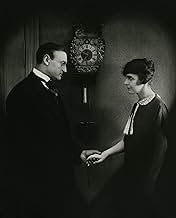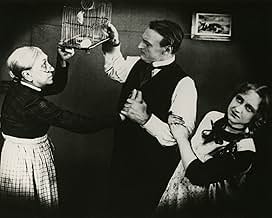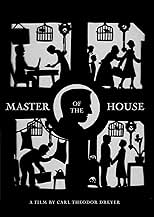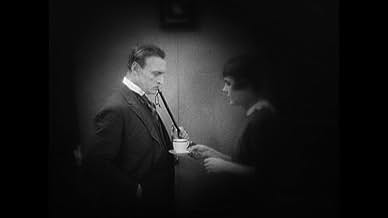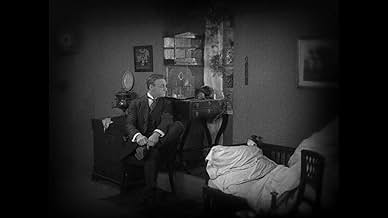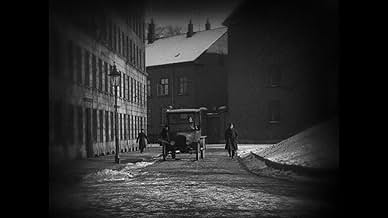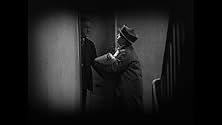NOTE IMDb
7,0/10
2,5 k
MA NOTE
Ajouter une intrigue dans votre langueWhen a man becomes tyrannical towards his family, the women of the house decide to teach him a lesson in gratitude.When a man becomes tyrannical towards his family, the women of the house decide to teach him a lesson in gratitude.When a man becomes tyrannical towards his family, the women of the house decide to teach him a lesson in gratitude.
- Réalisation
- Scénario
- Casting principal
Avis à la une
After seeing this movie (along with many other Dreyer's movies) I still wonder why people think that this Danish director is kind of boring.
This is perfect example of what Dreyer's cinematography is and what is not. This is a film where you can find some gentle spirit lying beneath. Some sort of quietness that fulfils the whole movie. As in many other of his early movies, Dreyer puts the spectator in a superior level. We are given the opportunity to watch an everyday's scene: a woman subjugated to a spoilt man's will. We watch her wake up early in the morning, wash dishes, clean the whole house, prepare her husband's breakfast and all she gets in exchange is bad manners and retreats from him. The complot that the nanny builds up to make the man feel guilty and so, to make him behave, unfolds in a subtle and sometimes funny way, making the watching more enjoyable from the distance.
It's hard to describe the perfect acting that the main characters bring to this beautiful film; an acting full of details and emotion.
Enjoyable form the first frame to the last one, this film will work perfectly for Dreyer's fans as long as for those who ever thought this was a tough one. It's, probably, the perfect bridge to approach to Dreyer's masterpieces such as "Ordet" and "Gertrud".
Hope you like it as much as I did.
This is perfect example of what Dreyer's cinematography is and what is not. This is a film where you can find some gentle spirit lying beneath. Some sort of quietness that fulfils the whole movie. As in many other of his early movies, Dreyer puts the spectator in a superior level. We are given the opportunity to watch an everyday's scene: a woman subjugated to a spoilt man's will. We watch her wake up early in the morning, wash dishes, clean the whole house, prepare her husband's breakfast and all she gets in exchange is bad manners and retreats from him. The complot that the nanny builds up to make the man feel guilty and so, to make him behave, unfolds in a subtle and sometimes funny way, making the watching more enjoyable from the distance.
It's hard to describe the perfect acting that the main characters bring to this beautiful film; an acting full of details and emotion.
Enjoyable form the first frame to the last one, this film will work perfectly for Dreyer's fans as long as for those who ever thought this was a tough one. It's, probably, the perfect bridge to approach to Dreyer's masterpieces such as "Ordet" and "Gertrud".
Hope you like it as much as I did.
Du Skal ære Din Hustru / Master of the House (1925) :
Brief Review -
One of the earliest films to break the silence on the domestic tyranny of husbands over housewives. A commandment for all men: "Thou Shalt Honour Thy Wife." I never really imagined an unorthodox filmmaker like Carl Theodor Dreyer making such a simple film with a sweet message. So Master of the House was like a notion breaker for me, and it also made me realise the fact that Dreyer was a master of all genres and various topics, that too in different cinema industries. This was a Danish film - a cinema industry that wasn't fully exposed to the pathbreaking cinema at that time. Yet, Carl brought them a pathbreaking topic without going beyond mainstream theories of society. Now this one is deeper and closer than it appears because it takes you inside a house. The film shows you the happenings we all see in every alternate family and almost every next couple. We all witness such things even today, almost a century later. So you can imagine the power and importance of this concept brought to light by Carl Theodor Dreyer. It was one of the earliest films to break the silence on domestic violence, verbal abuse, ill-treatment, and humiliation faced by common housewives. I am a man, but I felt for her, and I hated the man here, and I also liked the change in his behavior. That was predictable, though, and still extremely lovable. When a man loses his job, he becomes tyrannical towards his family and the women of the house. A nanny and mother-in-law decide to teach him a lesson in gratitude, or to the entire fraternity of male dominance for that matter. Astrid Holm makes a housewife that you'll love to have in your life, while Mathilde Nielsen's portrayal wins your heart. Carl Theodor Dreyer's film is sweet, simple and beautiful, but most importantly, it teaches all men to honour their wives, who tirelessly rub the house 27x7 for them.
RATING - 7.5/10*
By - #samthebestest.
One of the earliest films to break the silence on the domestic tyranny of husbands over housewives. A commandment for all men: "Thou Shalt Honour Thy Wife." I never really imagined an unorthodox filmmaker like Carl Theodor Dreyer making such a simple film with a sweet message. So Master of the House was like a notion breaker for me, and it also made me realise the fact that Dreyer was a master of all genres and various topics, that too in different cinema industries. This was a Danish film - a cinema industry that wasn't fully exposed to the pathbreaking cinema at that time. Yet, Carl brought them a pathbreaking topic without going beyond mainstream theories of society. Now this one is deeper and closer than it appears because it takes you inside a house. The film shows you the happenings we all see in every alternate family and almost every next couple. We all witness such things even today, almost a century later. So you can imagine the power and importance of this concept brought to light by Carl Theodor Dreyer. It was one of the earliest films to break the silence on domestic violence, verbal abuse, ill-treatment, and humiliation faced by common housewives. I am a man, but I felt for her, and I hated the man here, and I also liked the change in his behavior. That was predictable, though, and still extremely lovable. When a man loses his job, he becomes tyrannical towards his family and the women of the house. A nanny and mother-in-law decide to teach him a lesson in gratitude, or to the entire fraternity of male dominance for that matter. Astrid Holm makes a housewife that you'll love to have in your life, while Mathilde Nielsen's portrayal wins your heart. Carl Theodor Dreyer's film is sweet, simple and beautiful, but most importantly, it teaches all men to honour their wives, who tirelessly rub the house 27x7 for them.
RATING - 7.5/10*
By - #samthebestest.
Du skal ære din hustru was restored last year by Palladium, the original company that released it in 1925. It was also released on DVD along with the likewise newly restored Vredens Dag, Ordet and Gertrud. These are actually the first ever releases on DVD by the Danes themselves of their most important films. It took some time but the result is splendid, at least as far as Du skal ære din hustru is concerned. The current version is free from scratches and dirt and comes with the original Danish intertitles. It runs for 107 minutes.
Having seen the other early Dreyer films (before Jeanne) both long ago on the screen and on DVD relatively recent, I must say that this remains for me without doubt the most interesting one. Indeed it is great! This is because its success is purely cinematographic: Although based on the popular 1919 play "The tyrant's fall", it strikes me how little it resembles a stage performance; how well the natural acting (not in any way overacted) is integrated in the two or three small rooms of the troubled family's apartment, not least how excellently the scenes are constructed, and especially the lightning, which is never too bright, yet bringing out every detail in the house. It is a joy to see this environment come alive; a cross between a petit bourgeois and an upper working class world, as well as to study the many objects appearing from another time: The carefully hung pictures on the walls, the always-burning oven (it is winter) with its place for the kettle, and all the small oddities from a hundred years ago (well, almost). Indeed Dreyer himself paid utmost importance to it; he constructed everything from scratch to look exactly like a Christianshavn apartment, and he made sure that the camera always was positioned around the characters like it was another ghostly member of the family. We are drawn into the surroundings in a way that a theatre stage never could manage, and the actors are shown in their best possible manner, where only a small wink or a troubled gaze is enough to indicate what goes on inside them and how they interact with one another. This is a huge step forward from the previous films by Dreyer, and indeed from most other films at the time.
As the plot is well cared for by other posters, I will not bother here with any details but must say that I find the relationship between husband and wife to be as realistic as could be hoped for in a 1925 movie: Viktor may be a tyrant but only a household tyrant (they can be bad enough). He is cross, not violent. And Ida may be the typical suffering and under-appreciated wife but she bares her lot with great dignity. She loves him and supports him because she understands that his loss of business gives him hard times; he can barely support his family, yet he must appear like a winner to the outside world. The children seem to understand this as well, particularly the sympathetic and obedient Karen but also her younger brother Frederik, who must nevertheless endure some humiliating punishment. They seem to know every possible little detail that Viktor craves, and they try not to makes things worse for him. That leaves the rebel of the house, Viktor's old nanny, who provides both comical relief and some clever revenge structures. They all tell so much by playing so little, it is as if the story could be told almost by their gestures alone, without the need of the abundance of intertitles which to me are only stating the obvious. We can see what's going on; every frame tells a story and every cut makes us notice how swiftly the action can change from the tense to the out of hand. Dreyer is really himself the master of the house as far as editing is concerned, often creating fast moving scenes by making movement continue from one shot to another in a masterful way that was not common at that time. Today it easy to overlook such important details and consequently loose much of what makes this film special.
When first released, the film was an outstanding success, both with the critics and with the audiences, both in Denmark and abroad, most notably in France, where Le Temps saw its simplicity and attention to small details as a great example to be followed by French directors. In 1925, that included at least Jean Renoir, whose first films were not free from stagey drama and overacting (Nana...). The official Carl Th. Dreyer website provides both this review and others, although you need to brush up your Danish to read them (Well if James Joyce could do it...): It seems that the Danish critics all agreed that this was the best Danish film yet. The site also provides the full manuscript with many scenes missing from the current print. I think I remember seeing a beautiful scene where Karen, full of sisterly love, washes the nude Frederik, who is standing in a basin in the kitchen, but it is now missing. It is, however, shown on a still photo that is both on the DVD and on the Dreyer-site. Was it censored? Or is it just my dirty imagination? There are also some hilarious fantasy scenes in the manuscript, including one where Viktor is horsewhipping the entire family who are pulling him around on a wagon, that were either not filmed or cut somewhere along the way.
Anyway, the film as we have it in the current print remains one of the most moving of its era, as good as the similar ones by Murnau and Pabst from around the same time (say Tartuffe and Geheimnisse einer Seele), and that for me is as good as domestic cinema ever got in the twenties.
Having seen the other early Dreyer films (before Jeanne) both long ago on the screen and on DVD relatively recent, I must say that this remains for me without doubt the most interesting one. Indeed it is great! This is because its success is purely cinematographic: Although based on the popular 1919 play "The tyrant's fall", it strikes me how little it resembles a stage performance; how well the natural acting (not in any way overacted) is integrated in the two or three small rooms of the troubled family's apartment, not least how excellently the scenes are constructed, and especially the lightning, which is never too bright, yet bringing out every detail in the house. It is a joy to see this environment come alive; a cross between a petit bourgeois and an upper working class world, as well as to study the many objects appearing from another time: The carefully hung pictures on the walls, the always-burning oven (it is winter) with its place for the kettle, and all the small oddities from a hundred years ago (well, almost). Indeed Dreyer himself paid utmost importance to it; he constructed everything from scratch to look exactly like a Christianshavn apartment, and he made sure that the camera always was positioned around the characters like it was another ghostly member of the family. We are drawn into the surroundings in a way that a theatre stage never could manage, and the actors are shown in their best possible manner, where only a small wink or a troubled gaze is enough to indicate what goes on inside them and how they interact with one another. This is a huge step forward from the previous films by Dreyer, and indeed from most other films at the time.
As the plot is well cared for by other posters, I will not bother here with any details but must say that I find the relationship between husband and wife to be as realistic as could be hoped for in a 1925 movie: Viktor may be a tyrant but only a household tyrant (they can be bad enough). He is cross, not violent. And Ida may be the typical suffering and under-appreciated wife but she bares her lot with great dignity. She loves him and supports him because she understands that his loss of business gives him hard times; he can barely support his family, yet he must appear like a winner to the outside world. The children seem to understand this as well, particularly the sympathetic and obedient Karen but also her younger brother Frederik, who must nevertheless endure some humiliating punishment. They seem to know every possible little detail that Viktor craves, and they try not to makes things worse for him. That leaves the rebel of the house, Viktor's old nanny, who provides both comical relief and some clever revenge structures. They all tell so much by playing so little, it is as if the story could be told almost by their gestures alone, without the need of the abundance of intertitles which to me are only stating the obvious. We can see what's going on; every frame tells a story and every cut makes us notice how swiftly the action can change from the tense to the out of hand. Dreyer is really himself the master of the house as far as editing is concerned, often creating fast moving scenes by making movement continue from one shot to another in a masterful way that was not common at that time. Today it easy to overlook such important details and consequently loose much of what makes this film special.
When first released, the film was an outstanding success, both with the critics and with the audiences, both in Denmark and abroad, most notably in France, where Le Temps saw its simplicity and attention to small details as a great example to be followed by French directors. In 1925, that included at least Jean Renoir, whose first films were not free from stagey drama and overacting (Nana...). The official Carl Th. Dreyer website provides both this review and others, although you need to brush up your Danish to read them (Well if James Joyce could do it...): It seems that the Danish critics all agreed that this was the best Danish film yet. The site also provides the full manuscript with many scenes missing from the current print. I think I remember seeing a beautiful scene where Karen, full of sisterly love, washes the nude Frederik, who is standing in a basin in the kitchen, but it is now missing. It is, however, shown on a still photo that is both on the DVD and on the Dreyer-site. Was it censored? Or is it just my dirty imagination? There are also some hilarious fantasy scenes in the manuscript, including one where Viktor is horsewhipping the entire family who are pulling him around on a wagon, that were either not filmed or cut somewhere along the way.
Anyway, the film as we have it in the current print remains one of the most moving of its era, as good as the similar ones by Murnau and Pabst from around the same time (say Tartuffe and Geheimnisse einer Seele), and that for me is as good as domestic cinema ever got in the twenties.
The story of a "spoilt husband" - selfish, irritable, very ill-tempered and demanding as he rules the house, while his patient/devoted wife gets up at the crack of dawn to start her drab day of tending to his constant needs and complaints. Even the kids have to perform tasks all day rather than play to satisfy their tyrant of a father - but he's NEVER satisfied, nothing seems to be to his liking! Yeah, you got it, this guy is a serious jerk leaving me to wonder why the wife hasn't left him long ago. Luckily smart Nana, hubby's childhood nursemaid, steps up to the plate to help make some changes as she fetches the wife's mother and the two old women set out to straighten this guy out and teach him the lesson he so badly needs - to appreciate his wife. So the wife goes away for a "rest" (well needed, I should say) leaving hard-nosed Nana in charge of the brute!
This film is adequately entertaining, it is photographed in an interesting way, but is somewhat slow-moving and drags a bit in places. I would say at least half an hour shorter would have made this a better film. The acting is quite well done by all players. The version as shown on TCM included a pleasant piano score that sometimes suits the plot - and sometimes doesn't. Worth seeing.
This film is adequately entertaining, it is photographed in an interesting way, but is somewhat slow-moving and drags a bit in places. I would say at least half an hour shorter would have made this a better film. The acting is quite well done by all players. The version as shown on TCM included a pleasant piano score that sometimes suits the plot - and sometimes doesn't. Worth seeing.
The thing that struck me most about this film is how progressive it is though maybe not by today's standards. In a modern film Ida would be setting out for a divorce and establishing herself into a career and provided for her own but this is a film that revolves around a man learning to appreciate the work that his wife does and even coming to realize that while he earns the money, she has the harder job.
With the many different faces that the feminist movement has taken over the years this early step of correcting a man who has taken his wife for granted was especially meaningful for me. I'm not a business owner so it feels like there are many things that are out of my control to help women. I can't raise their wages or give them healthcare they need or even, as a poor person, help them get out of bad living situations.
What I can do, and is easier to forget than I would like to admit, is be gracious and kind, thankful that my wife is who she is and works as hard as she does.
As our culture has turned itself on its head with such an extreme form of Capitalism, it is easy to forget that the main function of a home is not to give wage earners a place to eat and sleep till they go back out into the world but rather, the other way around. The wage earner leaves the home to provide money so that the family, the home, can be a place people want to spend time and company within.
In this film, Viktor has it upside down and the women in his life see it. When he does not respond to verbal cues, they give him a last chance to learn, though it will be a hard lesson to swallow. In many ways this is a profoundly feminist film. The lead male is the only character who is seen as ignorant of his actions effects and he is the only one so stubborn as to believe that he is always in the right.
With the many different faces that the feminist movement has taken over the years this early step of correcting a man who has taken his wife for granted was especially meaningful for me. I'm not a business owner so it feels like there are many things that are out of my control to help women. I can't raise their wages or give them healthcare they need or even, as a poor person, help them get out of bad living situations.
What I can do, and is easier to forget than I would like to admit, is be gracious and kind, thankful that my wife is who she is and works as hard as she does.
As our culture has turned itself on its head with such an extreme form of Capitalism, it is easy to forget that the main function of a home is not to give wage earners a place to eat and sleep till they go back out into the world but rather, the other way around. The wage earner leaves the home to provide money so that the family, the home, can be a place people want to spend time and company within.
In this film, Viktor has it upside down and the women in his life see it. When he does not respond to verbal cues, they give him a last chance to learn, though it will be a hard lesson to swallow. In many ways this is a profoundly feminist film. The lead male is the only character who is seen as ignorant of his actions effects and he is the only one so stubborn as to believe that he is always in the right.
Le saviez-vous
- AnecdotesAt its original release in Paris, France, this film played in 57 theaters in three weeks.
- Citations
Opening Title Card: In the numerous streets of the Big City, house follows house, and in those houses, people live in layers - like wild birds carving their nests into the rock... nest above nest...
- Versions alternativesA 107-minute version with English intertitles and an uncredited piano score was shown on the Turner Classic Movies (TCM) channel in 2006. It had no crew credits other than the director (as Carl Dreyer) and only three cast members: Johannes Meyer (as Johs Meyer), 'Astrid Holm' and Mathilde Nielsen. The English names used were John and Mary for the husband and wife, presumably to indicate a typical family, and "Nana" for the Wetnurse. The two older children were called Kathleen and Dick.
- ConnexionsEdited into Mathilde Nielsen - Kavalkade (1941)
Meilleurs choix
Connectez-vous pour évaluer et suivre la liste de favoris afin de recevoir des recommandations personnalisées
- How long is Master of the House?Alimenté par Alexa
Détails
- Date de sortie
- Pays d’origine
- Langue
- Aussi connu sous le nom de
- Master of the House
- Société de production
- Voir plus de crédits d'entreprise sur IMDbPro
- Durée
- 1h 51min(111 min)
- Mixage
- Rapport de forme
- 1.33 : 1
Contribuer à cette page
Suggérer une modification ou ajouter du contenu manquant

